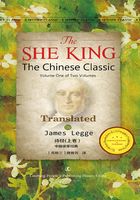
KAN T'ANG
1 [This] umbrageous sweet pear-tree;—
Clip it not, hew it not down.
Under it the chief of Shaou lodged.
2 [This] umbrageous sweet pear-tree;—
Clip it not, break not a twig of it.
Under it the chief of Shaou rested.
3 [This] umbrageous sweet pear-tree;—
Clip it not, bend not a twig of it.
Under it the chief of Shaou halted.


The eldest son by the wife proper of one of them became the 大宗 of the clan descended from him, and the 宗室 was an apartment dedicated to him. The old interpreters, going upon certain statements as to the training of the daughters in the business of sacrifices in this apartment, for 3 months previous to their marriage, contend that the lady spoken of was not yet married, but that the piece speaks of her undergoing this preparatory education. The imperial editors mention their view with respect, but think it better to abide by that of Choo. The door of the 室 was on the east side of it, and the window on the west; and by the 牖下 is to be understood the south corner beyond the window, which was the most honoured spot of the apartment. In I.3, 尸=主, 'to superintend'. The 其is little more than a particle. In cases like the text, Wang Yin-che calls it 擬議之詞, 'a term or particle of deliberative inquiry'. The wife presided over the arrangement of the dishes in sacrifice, and the fillin them with the vegetables and sauces. 齊 (read chae)=敬, 'to respect', 'reverent'. 季=少, 'young'. This term gives some confirmation to the old interpretation of the ode.
The rhymes are—in st. 1, 蘋, 濱, cat. 12, t. 1; 藻, 潦, cat. 2; in 2, 筥, 釜, cat. 5, t. 2: in 3, 下*, 女, ib.
Ode 5. Narrative. THE LOVE OF THE PEOPLE FOR THE MEMORY OF THE DUKE OF SHAOU MAKES THEM LOVE THE TREES BENEATH WHICH HE HAD RESTED. 召伯 might be translated'Shaou, the chief';—see note on the title of the Book.The nobleman is called pih, not as lord or duke of Shaou, but as invested with jurisdiction over all the States of the west. In the exercise of that, he had won the hearts of the people, and his memory was somehow connected with the tree which the poet had before his mind's eye, who makes the people therefore, as Tso-she says (XI. ix. under p. 1), 'thinking of the man and love the tree'. Stories are related by Han Ying and Lëw Heang of the way in which the chief executed his functions in the open air; but they owed their origin probably to the ode. We do not need them to enable us to enter into its spirit.
The kan-t'ang is, no doubt, a species of peartree. Maou identifies it with thetoo (杜), after the Urh-ya; others distinguish between them, saying that the fruit of the t'ang was whitish and sweet, while that of the too is red and sour. Maou makes 蔽芾= 'small-like'; much better seems to be Choo's view of the phrase, which I have followed. 伐=擊, 'to strike' the tree, 'hew it down'; 敗, acc to Choo,=折, 'to break it'; and 拜=屈,'to bend it',—as the body is bent in bowing. The tree becomes dearer, the more the poet keeps it before him. The concluding characters of the stanzas have nearly the same meaning. 茇 is explained by 草舍, 'to halt among the grass'; 說 (read shwuy; al.稅), simply by 舍,'to halt', 'to lodge'; and 憩 (al.愒), by 息, 'to rest'.
The rhymes are—in st. 1, 伐, 茇, cat. 15, t. 3; in 2, 敗,憩, ib.: in 3, 拜, 說, ib.

